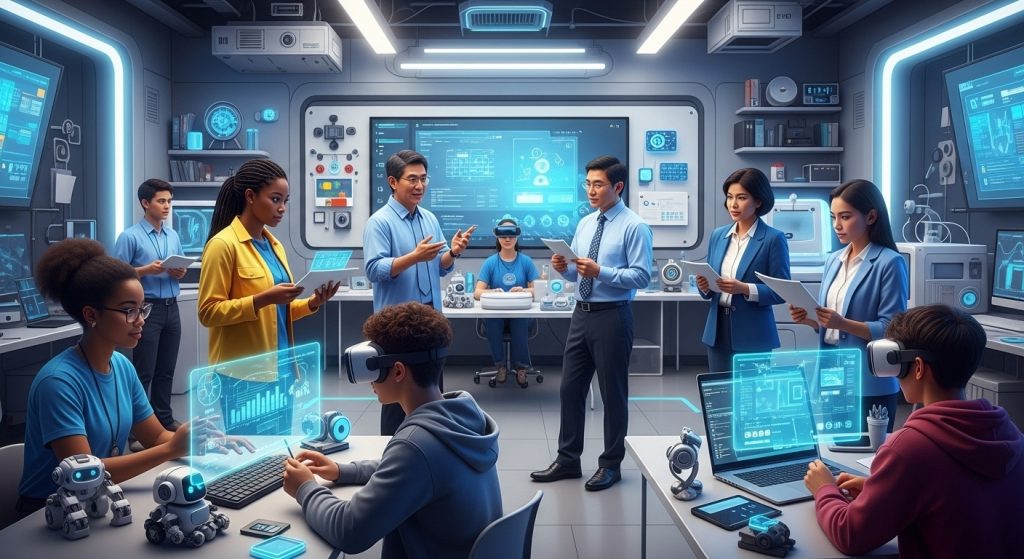The demand for skilled computer scientists is surging, fueled by advancements in AI, cybersecurity. Cloud computing, making a CS degree a hot ticket. But the traditional university lecture hall isn’t the only option anymore. Online programs are booming, offering flexibility and access to cutting-edge curricula, sometimes even incorporating virtual reality labs for hands-on experience. Yet, in-person programs provide invaluable networking opportunities and immersive campus experiences, fostering collaboration and mentorship often missing in the digital realm. So, how do you navigate this landscape? Choosing between coding in your pajamas or collaborating face-to-face requires careful consideration, weighing factors from learning style to career goals, ultimately determining which path best equips you to shape the future of technology.

Understanding the Core of a Computer Science Degree
At its heart, a Computer Science (CS) degree provides a foundational understanding of computational theory and practice. Whether pursued online or in person, the curriculum typically covers core areas such as:
- Data Structures and Algorithms
- Programming Languages
- Database Management
- Operating Systems
- Computer Architecture
- Software Engineering
The building blocks for efficient software development. Data structures organize data, while algorithms provide the steps to manipulate that data.
Mastery of languages like Python, Java, C++, or JavaScript is essential. These languages are the tools used to translate ideas into executable code.
Learning how to design, implement. Manage databases, which are crucial for storing and retrieving details.
Understanding the software that manages computer hardware and provides services for computer programs.
Gaining insights into the internal workings of computer systems, including processors, memory. Input/output devices.
Learning the principles and practices for designing, developing, testing. Maintaining large-scale software systems.
The quality of a CS program, irrespective of its delivery method, hinges on the depth of coverage in these areas and the opportunities provided for practical application through projects and internships.
The Allure of Online Computer Science Programs
Online Computer Science Colleges have surged in popularity, driven by flexibility and accessibility. Here’s a breakdown of their key advantages:
- Flexibility
- Accessibility
- Cost-Effectiveness
- Self-Discipline and Time Management
Online programs allow students to study at their own pace and schedule, making them ideal for working professionals or individuals with other commitments. Lectures are often recorded, allowing students to review material at their convenience.
Online programs break down geographical barriers, allowing students to access top-tier Computer Science Colleges regardless of their location. This opens doors to programs that might otherwise be inaccessible.
Online programs can sometimes be more affordable than in-person programs, due to lower overhead costs for the institution and reduced expenses for students (e. G. , commuting, housing).
Successfully completing an online program requires strong self-discipline and time management skills. This can be a valuable skill in itself, preparing students for the demands of the modern workplace.
But, potential drawbacks exist:
- Lack of Face-to-Face Interaction
- Technical Difficulties
- Procrastination and Isolation
The absence of in-person interaction can hinder networking opportunities and make it more challenging to build relationships with professors and peers.
Reliable internet access and computer proficiency are essential for online learning. Technical glitches can disrupt the learning experience.
The flexibility of online programs can lead to procrastination. The lack of a physical classroom environment can contribute to feelings of isolation.
The Traditional In-Person Computer Science Experience
In-person Computer Science Colleges offer a traditional learning environment with distinct advantages:
- Direct Interaction
- Structured Learning
- Access to Resources
- Social and Extracurricular Activities
In-person classes provide opportunities for direct interaction with professors and peers, fostering a collaborative learning environment. This can lead to deeper understanding and stronger networking connections.
In-person programs typically follow a more structured schedule, which can be beneficial for students who thrive in a structured environment.
In-person students have access to campus resources such as libraries, labs. Career services, which can enhance their learning experience and career prospects.
Campus life offers a wide range of social and extracurricular activities, providing opportunities for personal growth and development.
But, in-person programs also have potential drawbacks:
- Higher Cost
- Less Flexibility
- Commuting and Location Constraints
In-person programs tend to be more expensive than online programs, due to higher tuition fees and living expenses.
In-person classes require students to adhere to a fixed schedule, which can be challenging for those with other commitments.
Students must commute to campus, which can be time-consuming and expensive. Location can also be a constraint, limiting students’ choices to Computer Science Colleges within their geographical area.
Key Differences: A Head-to-Head Comparison
Let’s break down the key differences between online and in-person CS degrees in a more structured format:
| Feature | Online Computer Science Degree | In-Person Computer Science Degree |
|---|---|---|
| Flexibility | High; study at your own pace and schedule | Low; fixed class schedules |
| Accessibility | High; access programs from anywhere | Low; limited by location |
| Cost | Potentially lower; reduced overhead and expenses | Potentially higher; tuition, living expenses |
| Interaction | Limited; primarily online forums and virtual meetings | High; direct interaction with professors and peers |
| Resources | Potentially limited; reliance on digital resources | High; access to libraries, labs. Career services |
| Structure | Less structured; requires self-discipline | More structured; provides a clear schedule |
| Networking | Potentially weaker; online interactions may be less impactful | Potentially stronger; in-person connections can lead to lasting relationships |
Accreditation: The Foundation of Quality
Regardless of whether you choose an online or in-person program, accreditation is paramount. Accreditation signifies that a program meets certain quality standards and is recognized by a reputable accrediting agency. Look for accreditation from organizations like ABET (Accreditation Board for Engineering and Technology), which is a widely recognized accreditor for Computer Science programs.
Accreditation ensures that the curriculum is rigorous, the faculty is qualified. The program provides adequate resources for students. It also enhances the credibility of your degree with employers.
The Importance of Hands-on Experience
A Computer Science degree is not just about theoretical knowledge; it’s also about practical skills. Look for programs, both online and in-person, that offer opportunities for hands-on experience through:
- Coding Projects
- Internships
- Research Opportunities
- Hackathons
Working on real-world coding projects is essential for developing practical programming skills.
Internships provide valuable experience in a professional setting, allowing students to apply their knowledge and skills to real-world problems.
Participating in research projects can expose students to cutting-edge technologies and contribute to the advancement of the field.
Participating in hackathons is a great way to develop problem-solving skills and network with other developers.
These experiences will not only enhance your technical skills but also make you a more competitive candidate in the job market.
Career Goals and Program Selection
Your career goals should play a significant role in your program selection. Consider the following:
- Software Development
- Data Science
- Cybersecurity
- Artificial Intelligence
If you aspire to be a software developer, look for programs that emphasize programming languages, data structures. Software engineering principles.
If you are interested in data science, choose programs that cover statistics, machine learning. Data visualization.
If you want to work in cybersecurity, look for programs that cover network security, cryptography. Ethical hacking.
If you are interested in AI, choose programs that cover machine learning, natural language processing. Computer vision.
Research the curriculum of different programs and see if they align with your career aspirations. Look for programs that offer specialized courses or concentrations in your area of interest.
Real-World Examples and Case Studies
To illustrate the potential pathways and outcomes, consider these examples:
- Case Study 1: The Working Professional
- Case Study 2: The Recent High School Graduate
- Real-World Application
Sarah, a software developer with five years of experience, wanted to advance her career but couldn’t afford to quit her job. She enrolled in an online Computer Science program, taking courses in the evenings and on weekends. The flexibility of the online program allowed her to balance her work and studies. She eventually earned her degree and got promoted to a senior developer position.
David, a recent high school graduate with a passion for computer science, chose to attend an in-person program at a top university. He valued the direct interaction with professors and the access to campus resources. He actively participated in research projects and internships, which helped him land a job at a leading tech company after graduation.
Consider the development of a mobile app for a local business. An in-person program might involve a team of students working together in a lab, brainstorming ideas. Coding collaboratively. An online program might involve students working remotely, using online tools to communicate and collaborate. Both approaches can lead to a successful outcome. The learning experience will be different.
The Future of Computer Science Education
The field of Computer Science is constantly evolving. So is the landscape of Computer Science Colleges. Online learning is becoming increasingly sophisticated, with advancements in virtual reality, augmented reality. Artificial intelligence. These technologies are creating more immersive and engaging online learning experiences.
In-person programs are also adapting to the changing needs of students, with more emphasis on experiential learning, project-based learning. Interdisciplinary collaboration. The future of computer science education is likely to involve a blend of online and in-person learning, with students having more choices and flexibility than ever before.
Conclusion
Ultimately, the “best” path – online or in-person – hinges on your individual needs and learning style. Consider your self-discipline; can you thrive in the independent environment of online learning, or do you benefit from the structure and immediate feedback of a physical classroom? I remember struggling with debugging a complex algorithm until a professor pointed out a tiny error in person – a moment that solidified my understanding in a way online forums couldn’t. The tech landscape is evolving rapidly, with hybrid models becoming increasingly popular. Look for programs that offer a blend of online flexibility and in-person collaboration, perhaps through intensive workshops or lab sessions. Before committing, reach out to current students and alumni from both online and in-person programs you’re considering. Their experiences will provide invaluable insights. No matter your choice, remember that continuous learning is key in computer science. Embrace the challenge, stay curious. You’ll build a successful career.
More Articles
Top Engineering Universities in Germany: Your 2025 Degree Guide
Top Universities: Your Guide to the Best German Engineering Programs
A Complete Guide: Navigating Student Life in Germany as an International Student
Budget-Friendly Guide: What is the Real Cost of Living in Germany?
FAQs
Okay, so what’s the BIG difference between getting a Computer Science degree online versus in person?
Think of it like this: In-person is your classic classroom setting – lectures, labs, face-to-face interaction. Online is more flexible, often asynchronous (meaning you don’t always have to be ‘live’ at a specific time). Relies heavily on digital tools. Both cover the same core material. The delivery and learning style are pretty different.
I’m a super social person! Is online learning going to leave me feeling isolated?
That’s a valid concern! Online programs are getting better at fostering community through forums, virtual study groups. Even online office hours. But honestly, if you thrive on real-time interaction and bouncing ideas off classmates in person, the in-person experience might be a better fit. Consider how much you need that face-to-face contact.
What about cost? Is one option generally cheaper than the other?
Usually, online programs can be cheaper. You avoid things like commuting costs and potentially even on-campus fees. But, tuition structures vary wildly between universities, so definitely compare the total cost of attendance for specific programs you’re interested in. Don’t assume online always equals cheaper!
How will employers view an online Computer Science degree versus a traditional one?
Honestly, these days, most employers don’t really care how you got the degree, as long as it’s from an accredited institution. What they do care about is your skills and experience. So, focus on building a strong portfolio, contributing to open-source projects. Landing internships, regardless of whether you’re learning online or in person.
I’m working full-time. Is getting a CS degree online a realistic option for me?
Absolutely! That’s a major perk of online learning – the flexibility to study around your existing commitments. Just be realistic about the time commitment required. CS is demanding, so you’ll need to be disciplined and organized to juggle work, life. Your studies. Time management is key!
What if I struggle with staying motivated without a structured classroom environment?
That’s a common challenge with online learning. If you know you need external accountability, an in-person program might be better. But if you’re set on online, try to create your own structure: set daily study goals, find an online study buddy. Schedule regular check-ins with yourself. Consider that self-discipline is a very valuable skill in any career!
Does it matter if I’m totally new to coding? Is one format better for beginners?
For total beginners, having the immediate support and guidance of an instructor in person can be really helpful. You can ask questions on the spot and get immediate feedback. But, many online programs offer excellent introductory courses and resources specifically designed for beginners. Check out the program’s support systems and resources for newbies before deciding.



